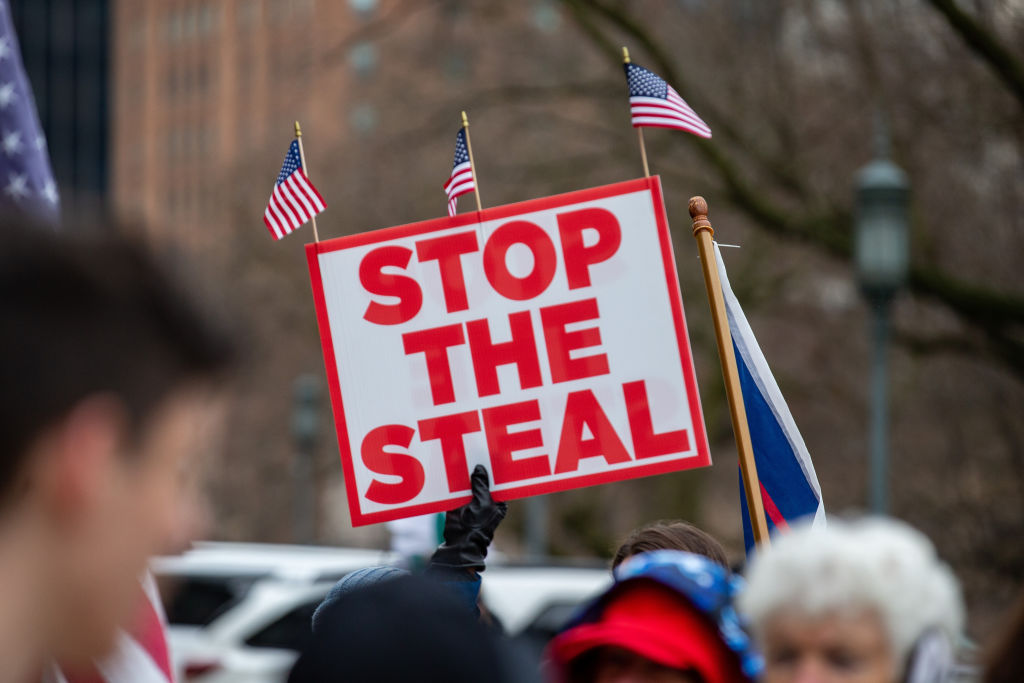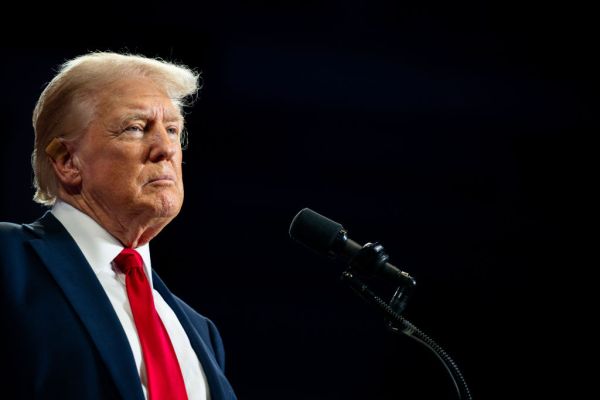Earlier this month, Georgia Democratic gubernatorial nominee Stacey Abrams suffered a decisive loss in court in her long-running attempt to cast doubt on her 2018 loss. Abrams, who lost to Brian Kemp by nearly 55,000 votes, never conceded, claiming racially motivated voter suppression. Abrams alleged all kinds of violations of the Constitution and the Voting Rights Act. Nonetheless, U.S. District Court Judge Steve C. Jones (an Obama appointee) ruled against her organization, Fair Fight Action, on all counts.
When reading this, my mind turned to comments made by The Dispatch’s own Nick Catoggio, in his farewell blog at Hot Air. Given the current direction of his side of the political divide, he was left with a choice between being dishonest or losing his audience, who wanted him to stop saying negative things about former President Donald Trump. “I preferred to be a traitor than a propagandist,” he said. The reason? “Propagandists lie to others, then lie to themselves to justify propagating the original lie. Propaganda rots the brain, then the soul,” he wrote.
For years, Abrams and her supporters drove “voter suppression” as an existential threat to bedrock civil rights, even though by no reasonable definition of the term does it describe her loss in 2018. But, they may have thought to themselves, “African-Americans don’t vote in high enough numbers due to generations of sins against them, if a little fib helps get more of them registered, it’s fine.” And also, “ Trump was an existential threat to our country, and without this massive push claiming vote suppression, we may be able to register sufficient voters to push Democrats over the top in Georgia.”
Indeed, the Abrams propaganda machine was a predecessor and a precursor to a much larger effort by Trump and his supporters. Starting in 2016, powerful people had an incentive to spread an unusual amount of untruth, and did so, believing that it could be contained. “Sure,” they might say, “Trump is an arrogant hot-head with a history of shady business deals, who lacks relevant experience, and a moral constitution,” but given the stakes, we needed to try. And, they might say to themselves, “We just must do it this once. We can stop later.”
The army of pundits, columnists, talk radio personalities, and politicians likely told themselves, “Our basic rights are threatened, and we have no choice but to take our chances.” Michael Anton, author of the infamous “Flight 93 election” essay admitted such talk “sounds histrionic,” (accurate!) but insisted was true (not so much). Let’s just get past this crisis, and we can calm things down again.
But hearts and minds don’t work that way.
The chief mission of Trump’s propagandists was to convince his supporters that the constant attention and condemnation Trump got for, say, attempting to utilize his public office to illegally co-opt a foreign country into doing his campaign work, or threatening an elections official if he didn’t invent votes to help him overturn an election, or egging on those who physically threatened Vice President Mike Pence on January 6, was nothing but a political witch hunt, and that Trump was uniquely being targeted for abuse. The substance was too damning. Thus, the “witch hunt” had to be the takeaway.
The logic took its own course. Now every attempt to push back on Trump’s abuses, no matter how justified, is just part of the “witch hunt.”
Trump’s backers were using a well-utilized playbook. Former President Bill Clinton and his enablers utilized the same basic tactics against the late Ken Starr, a mild-mannered and well-respected former judge and former solicitor general who was appointed to investigate various Clinton scandals. This led to the discovery of now widely accepted fact that Clinton had abused his authority to have an affair with a young intern and lied under oath about it. The takeaway couldn’t be about Clinton’s abuse of power and lawlessness, it had to be Starr and the vast right-wing conspiracy that was out to get him.
This plays out in a doubly harmful way. First, it makes people believe their “side” is being uniquely persecuted. That alone creates a belief that, since our circumstances are unjust, we can respond in kind. It’s a downward spiral. Second, since the “persecution” is unjust, the behaviors that led to this persecution must be okay.
We’ve watched pundits, politicians, and thought leaders continually ignore things they’d never have ignored if the shoe had been on the other foot. Those people who thought they could stop after 2016 are stuck six years later defending the idea that Trump can declassify documents he stole by thinking about them.
This is particularly toxic when it comes to Christian leaders who, if they believe what they claim, ought to know better. Dr. James Dobson, who previously said that accepting a man lacking character was “fundamentally incompatible,” with doing good for the nation, suddenly discovered such things were really “frivolous personality characteristics” when his own preferred positions were threatened, without even attempting to justify the obvious contradiction. Albert Mohler, the president of the Southern Baptist Convention once said, “If I were to support, much less endorse, Donald Trump for president, I would actually have to go back and apologize to former President Bill Clinton.” He later called a reverend who held him accountable for flip-flopping a “liberal nitwit” for taking the same position Mohler did a few years earlier.
It would be easy to chalk this up to extreme political cynicism. And that’s certainly part of it. But Catoggio’s maxim gets to something else: At a certain point, people who have dealt in propaganda start to believe it.
Perhaps voters of all parties, colors and creeds ought to really look at the civil rights movement for some guidance, rather than just use its legacy as a club.
Howard Thurman, a pastor, academic, and civil rights leader, writing in 1949 primarily for black audiences in his book Jesus and the Disinherited, cautioned those enraged at the injustice and persecution faced by black Americans against doing anything that would compromise the truth, because he recognized something profound: Once propaganda is unleashed, it becomes a way of life.
“If a man continues to call a good thing bad, he will inevitably lose his sense of moral distinctions.
Is this always the result? Is it not possible to quarantine a certain kind of deception so that it will not affect the rest of one’s life? May not the underprivileged do with deception as it relates to his soul what the human body does with tubercle bacilli? The body seems unable to destroy the bacilli, so nature builds a prison for them, walls them in with a tick fibrosis so that their toxin cannot escape from the lungs into the blood stream. As long as the victims exercises care in the matter of the rest, work, and diet, normal activities may be pursued without harm. Is deception a comparable technique of survival, the fibrosis that protects the life from poison in its total outlook or in its other relations? Or, to change the figure, may not deception be regarded under some circumstances as a kind of blind spot that functional in a limited area of experience? No! Such questions are merely attempts to rationalize ones way out of a critical difficulty.
The penalty of deception is to become a deception, with all sense of moral discrimination vitiated. A man who lies habitually becomes a lie, and it is increasingly impossible for him to know when he is lying and when he is not.”
Martin Luther King is said to have carried a copy of Thurman’s book around wherever he went.
Thurmond was writing well before the 1964 Civil Rights Act or 1965 Voting Rights Act. The racism and violence of the Jim Crow South, and a North that was, at best, largely indifferent to the plight of black Americans, could easily have been seen to justify far more than Thurman was cautioning against. And things got worse for a long time. Emmett Till died six years later, and the 16th Street Baptist Street Church bombing in Birmingham, Alabama, killed four girls eight years after that. And much of Thurman’s audience couldn’t even vote.
In other words, Thurman and his audience were facing real persecution and real voter suppression.
Yet today, having imbibed their own propaganda so deeply, men like Anton are now openly justifying violent revolution, arguing that our current times resemble 1776, in essence, because he believes his side is losing.
Ironically, Anton specifically cites FBI corruption and politicization as one of his chief concerns. Good luck putting either of those by Martin Luther King and other civil rights leaders, who know a lot more about what a real out-of-control FBI looks like.
Of course, not everyone who has promoted this kind of propaganda is as hysterical as Anton. Rachel Bovard, a former staffer for libertarian scion Rand Paul, is now saying that the federal government is the only thing with enough power to hold back the “woke industrial complex.”
So, you might not actually call for open warfare, you might just forsake the ideas you got into politics to promote.
For her part, Abrams spent years making her side believe they were living under “Jim Crow 2.0.” When the 2020 Georgia primary happened, with no problems, many African Americans were surprised. “I had heard that they were going to try to deter us in any way possible. … To go in there and vote as easily as I did and to be treated with the respect that I knew I deserved as an American citizen — I was really thrown back,” said Patsy Reid, a 70-year-old black retiree. The long-term negative effects of these kinds of scare tactics is difficult to overstate.
Another example: Pastor Bill Bolin, who became a minor celebrity for opposing various COVID policies in Michigan and who by his own admission “almost” went to the January 6 protests-turned-autocoup, insists that false info and wild exaggerations he’s given out for the sake of politics, won’t cause people to doubt his Christian witness. I’m not so sure. If, as David French recently wrote, “If morality was the core, and there was no morality, then what was left?” If Pastor Bolin will play fast and loose with the truth concerning one thing, why not another?
The scariest thing is, I doubt these people think they are lying. They have promoted propaganda for so long, they believe it. And the cost of propaganda is that those who promote and imbibe it “become a lie” as Thurman says. In becoming a lie, they lose all sense of mission, method, and priority.
At best, you win at a contest you didn’t want to play, having lost at the contest you wanted to win long ago.
That’s the real cost of propaganda. And the country is paying the price.








Please note that we at The Dispatch hold ourselves, our work, and our commenters to a higher standard than other places on the internet. We welcome comments that foster genuine debate or discussion—including comments critical of us or our work—but responses that include ad hominem attacks on fellow Dispatch members or are intended to stoke fear and anger may be moderated.